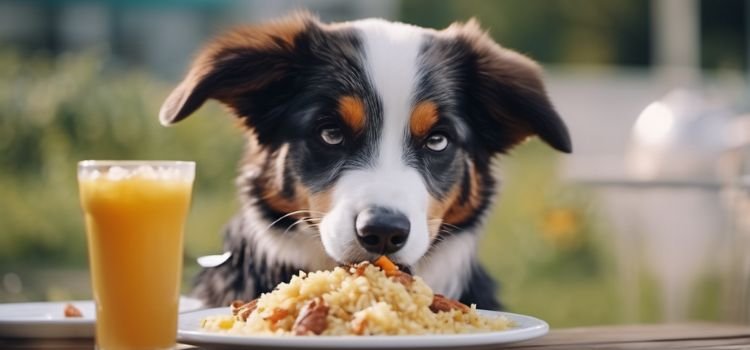As an Amazon Associate committed to the mission of improving the lives of our readers, Live-Clear.com receives a small commission from eligible purchases made through our affiliate links. This revenue enables us to keep producing insightful articles and other material.
Yes, chicken and rice can make a dog constipated by lacking sufficient fiber content. Chicken and rice, often recommended for dog with upset stomachs or sensitive digestive systems, may unintentionally lead to constipation in some dogs.
While these ingredients provide easily digestible proteins and carbohydrates, they may lack the necessary fiber needed to promote regular bowel movements. Fiber plays a crucial role in adding bulk to the stool and facilitating its movement through the digestive tract.

Without enough fiber, the stool can become hard and difficult to pass, leading to constipation. Therefore, it is important to ensure a balanced diet for dogs, incorporating both lean proteins and high-fiber ingredients to maintain a healthy digestive system and regular bowel movements.
The Effect Of Chicken And Rice Cause Dog Constipation
Chicken and rice can cause constipation in dogs if not properly balanced. It’s important to provide a balanced diet with adequate fiber to ensure a healthy digestive system for your furry friend.
Understanding A Dog’s Digestive System
A dog’s digestive system plays a crucial role in their overall health and well-being. Their digestive tract is designed to break down and absorb nutrients from the food they consume. It consists of various organs, including the mouth, esophagus, stomach, small intestine, and large intestine. Each organ has a specific function in the digestion and absorption process, ensuring that the nutrients are efficiently utilized by the dog’s body.
The Benefits Of Chicken And Rice For Dogs
Chicken and rice are commonly used as a bland diet for dogs with sensitive stomachs or those recovering from illness. These ingredients are easily digestible for dogs, making them suitable for temporary dietary changes. The health benefits of chicken and rice include:
- Poultry, such as chicken, is a great source of lean protein, which is essential for building and repairing tissues in a dog’s body.
- Rice is a simple carbohydrate that provides energy to dogs while being easy on their digestive system.
- Both chicken and rice contain vitamins and minerals that contribute to a dog’s overall health and immune system.
- Chicken is also a natural source of glucosamine, which can help support joint health in dogs.
When introducing chicken and rice to your dog’s diet, it is important to do so gradually and in appropriate portions. This will allow your dog’s digestive system to adjust to the new food and reduce the risk of any adverse effects.
In conclusion, while chicken and rice can be beneficial for dogs, it is essential to monitor their digestive system and ensure they are not experiencing any constipation or other digestive issues. If you notice any unusual symptoms, it is advisable to consult with your veterinarian for further guidance.

Can Chicken And Rice Cause Dog Constipation?
Chicken and rice are commonly used in dog diets, but they can potentially lead to constipation in dogs. It’s essential to monitor their bowel movements and consult with a veterinarian for a balanced and healthy diet.
Signs And Symptoms Of Constipation
Constipation in dogs can be difficult to spot, as they can’t verbally communicate their discomfort. However, there are some common signs and symptoms that may indicate your furry friend is experiencing constipation:
- Decreased or no bowel movements.
- Straining or difficulty during elimination.
- Dry, hard, or small stools.
- Pain or discomfort while trying to defecate.
- Bloating or abdominal discomfort.
- Lethargy or decreased appetite.
If you notice any of these signs, it’s important to monitor your dog’s bowel movements and seek veterinary advice if the issue persists.
Causes Of Constipation In Dogs
Understanding the causes of constipation in dogs can help us prevent and manage the condition effectively. Here are some common culprits that can lead to constipation:
- Dietary changes or inappropriate diet.
- Insufficient fiber intake.
- Dehydration.
- Lack of exercise.
- Obesity or higher weight.
- Side effects of certain medications.
- Underlying medical conditions, such as intestinal blockages or anal gland issues.
It’s important to note that introducing chicken and rice into your dog’s diet can be a potential cause of constipation, especially if done abruptly or without proper proportions. While chicken and rice are often used as a bland diet during digestive disturbances, it’s always best to consult with your veterinarian before making any changes to your dog’s diet.
By staying aware of the signs and symptoms of constipation and addressing any underlying causes, you can help keep your furry friend’s digestive system running smoothly and ensure their overall well-being.

Factors To Consider When Feeding Chicken And Rice To Dogs
Feeding chicken and rice to dogs can potentially cause constipation. It is important to consider the factors such as portion size, digestive health, and balanced nutrition to prevent this issue.
Factors to Consider when Feeding Chicken and Rice to Dogs
Feeding your dog a diet of chicken and rice can provide numerous benefits, including being gentle on their digestive system and providing easily digestible protein and carbohydrates. However, it’s important to consider certain factors to ensure your furry friend stays healthy and doesn’t experience any adverse effects. When feeding chicken and rice to dogs, here are some essential factors to keep in mind:
Feeding Chicken and Rice in Moderation
Feeding chicken and rice to your dog in moderation is crucial. While this combination can be a great option for dogs with sensitive stomachs or those recovering from an upset stomach, excessive consumption can lead to constipation. As a general rule of thumb, chicken and rice should only make up a small portion of your dog’s overall diet. A balanced diet consists of a variety of high-quality proteins, carbohydrates, fats, and additional nutrients. By incorporating chicken and rice along with other ingredients, you can provide a well-rounded meal for your canine companion.
Balancing a Diet For Chicken And Rice Cause Dog Constipation
To ensure your dog receives all the necessary nutrients, it’s important to balance their diet with additional ingredients. While chicken and rice may provide some essential nutrients, they should not be the sole components of your dog’s meal. Adding vegetables and fruits not only introduces vitamins and minerals but also adds fiber to support healthy digestion. It is recommended to consult with your veterinarian to determine the appropriate portion size and to identify any specific dietary needs your dog may have.
Making The Transition To Chicken And Rice Cause Dog Constipation
Before making any changes to your dog’s diet, it’s essential to make a gradual transition. Introduce chicken and rice slowly, mixing them with their current food over several days. This gradual transition allows your dog’s digestive system to adjust and avoids any sudden changes that may upset their stomach. Additionally, be mindful of any potential allergies your dog may have to chicken or grains. If your dog shows signs of an adverse reaction, such as itching, diarrhea, or vomiting, discontinue feeding them chicken and rice and consult your veterinarian for alternative dietary options.
In conclusion, while chicken and rice can be beneficial parts of a dog’s diet, they should be fed in moderation and balanced with additional ingredients. By considering these factors, you can ensure your dog stays healthy, maintains regular digestion, and receives a Nutritionally balanced meal. Remember, it’s always best to consult your veterinarian for personalized advice tailored to your dog’s specific dietary needs.

Tips To Prevent Constipation When Feeding Chicken And Rice To Dogs
If you’ve ever dealt with a constipated dog, you know it can be a frustrating and uncomfortable experience for both you and your furry friend. Feeding chicken and rice is a common home remedy for dogs with digestive issues like diarrhea or an upset stomach. However, in some cases, this bland diet can actually cause constipation. By following a few simple tips, you can help prevent constipation and keep your dog’s digestive system running smoothly.
Ensuring Sufficient Water Intake
Water is essential for maintaining proper digestion and preventing constipation in dogs. When feeding your dog chicken and rice, it’s important to ensure they have access to fresh and clean water at all times. Without enough water, the digestive system can become dehydrated, making it difficult for stools to pass through the intestines.
Encourage your dog to drink water by:
- Keeping their water bowl in a convenient location.
- Refilling the water bowl frequently to ensure freshness.
- Using a larger water bowl if necessary.
- Adding ice cubes to make it more enticing, especially during hot weather.
Adding Fiber-rich Ingredients To The Meal
Dietary fiber plays a crucial role in maintaining regular bowel movements and preventing constipation. When feeding your dog chicken and rice, consider adding fiber-rich ingredients to their meal. These ingredients can help bulk up the stools and promote healthy digestion.
Some fiber-rich ingredients you can add include:
| Ingredient | Amount |
|---|---|
| Pumpkin puree | A tablespoon or two |
| Canned green beans | A small handful |
| Steamed broccoli | A few florets |
Remember to introduce these ingredients gradually and in moderation, as sudden dietary changes can upset your dog’s stomach. Consulting with your veterinarian is always recommended before making any adjustments to your dog’s diet.
By ensuring sufficient water intake and incorporating fiber-rich ingredients into your dog’s chicken and rice meals, you can help prevent constipation and promote a healthy digestive system. Remember, if constipation persists or if your dog shows signs of discomfort, it’s best to consult with a veterinarian for further guidance.

Alternatives To Chicken And Rice For Dogs With Digestive Issues
Dogs with digestive issues may experience constipation from a chicken and rice diet. However, there are alternative options available, such as lean proteins like fish or turkey, and easily digestible carbs like sweet potatoes or pumpkin.
Introduction To Alternative Protein Sources
If chicken and rice aren’t suitable for your dog’s digestive issues, there are several alternative protein sources you can consider. These alternatives will provide similar nutritional benefits while being gentle on your furry friend’s stomach.
Exploring Grain-free Options
Besides exploring alternative protein sources, you can also opt for grain-free options. By eliminating grains from your dog’s diet, you may alleviate digestive issues. Grain-free diets mimic a dog’s natural diet and can be highly beneficial for dogs with sensitive stomachs.
To replace chicken with alternative protein sources, consider the following options:
| Protein Source | Description |
|---|---|
| Turkey | Turkey is a lean protein option that is highly digestible and low in fat. |
| Beef | Beef is another protein-rich alternative, but ensure it is lean and free from additives. |
| Lamb | Lamb is easily digestible and can be a good option for dogs with sensitive stomachs. |
| Fish | Fish is rich in omega-3 fatty acids and can be a great source of protein for dogs with allergies. |
Remember to introduce any new protein source gradually, monitoring your dog’s response. It’s advisable to consult your veterinarian to determine the best alternative protein source for your dog’s specific dietary needs.
When it comes to grain-free options, consider the following:
- High-Quality Commercial Grain-Free Dog Food: Look for brands that prioritize real meat as the primary ingredient and avoid fillers such as corn or soy.
- Homemade Grain-Free Diets: If you prefer to prepare your dog’s meals at home, there are plenty of grain-free recipes available online.
- Novel Protein and Limited Ingredient Diets: These diets consist of unique protein sources like venison or duck, reducing the likelihood of triggering digestive issues.
By incorporating these alternative protein sources and exploring grain-free options, you can find the perfect balance for your dog’s dietary needs. Remember to monitor your dog’s response to changes and consult with your veterinarian for personalized advice.

Consulting A Veterinarian For Proper Nutritional Guidance
Get professional advice from a veterinarian to ensure your dog’s nutrition is balanced and suitable. A veterinarian can offer guidance on the right diet, preventing issues like constipation caused by a chicken and rice diet.
Importance Of Professional Advice
It is crucial to consult a veterinarian for proper nutritional guidance when it comes to your dog’s diet. A professional opinion ensures that you are making the right choices to address your dog’s specific needs. This is especially important if you suspect that chicken and rice may be causing constipation in your furry friend. A veterinarian can provide expert advice tailored to your dog’s breed, age, weight, and overall health condition. They have the knowledge and experience to assess the nutritional requirements of your dog and guide you on the best course of action. Seeking professional help will ensure that you do not inadvertently harm your dog’s digestive system by attempting to address the issue on your own.
Addressing Individual Dog’s Needs
Every dog is unique, and what works for one may not necessarily work for another. When it comes to combating constipation, it is important to address your individual dog’s needs. A veterinarian can help you understand the specific factors contributing to constipation in your dog and offer tailored advice accordingly. They will consider factors such as:
- Age and breed of your dog.
- Daily activity levels and exercise routine.
- Previous medical history and current health conditions.
- Dietary preferences and restrictions.
Based on these factors, a veterinarian can recommend dietary adjustments that may include alternative sources of fiber or specific supplements to alleviate constipation. By focusing on your dog’s individual needs, the likelihood of a successful resolution to the constipation issue increases. Consulting a veterinarian is the best way to ensure that your dog’s nutritional needs are met, and any digestive issues are properly addressed.
Remember, each dog is unique, and what works for one may not work for another. Seek professional advice to understand and address your dog’s specific needs effectively.

Conclusion
To sum up, it is important to be mindful of your dog’s diet, as certain foods like chicken and rice can potentially lead to constipation in dogs. While chicken and rice can be a beneficial combination for their health, it is recommended to moderate the quantity and ensure a well-balanced diet.
Frequently Asked Questions On Can Chicken And Rice Make A Dog Constipated
A diet consisting primarily of chicken and rice can potentially cause constipation in dogs due to a lack of fiber content.
Chicken and rice alone may lack the necessary fiber to promote healthy bowel movements, leading to constipation in dogs.
Symptoms of constipation in dogs include straining during bowel movements, dry or hard stools, and decreased frequency of defecation.
To prevent constipation when feeding chicken and rice, consider adding fiber-rich vegetables or supplements to their diet to promote regular bowel movements.
Opt for balanced dog food options that include a variety of protein sources, grains, and fiber-rich vegetables to maintain healthy digestion and prevent constipation.
Observing your dog’s overall health, providing ample hydration, and consulting with a veterinarian are essential for maintaining their digestive harmony.
Amazon and the Amazon logo are trademarks of Amazon.com, Inc, or its affiliates.



